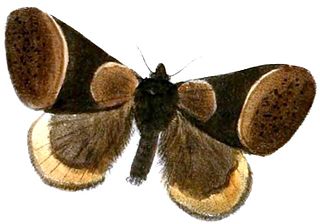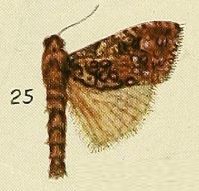
Brahmaeidae is a family of insects in the order Lepidoptera, commonly known as Brahmin moths. It includes species formerly included in the family Lemoniidae.

Brahmaea (Acanthobrahmaea) europaea, the European owl moth, is a lepidopteran from the family Brahmaeidae, in the subgenus Acanthobrahmaea.

Brahmaea wallichii, also known as the owl moth, is a moth from the family Brahmaeidae, the Brahmin moths, and one of its largest species. It is found in the north of India, Nepal, Bhutan, Myanmar, China, Taiwan, and Japan. The owl moth is nocturnal. The wingspan is about 90–160 millimetres.

Brahmaea is a genus of moths of the family Brahmaeidae.

Heracula is a genus of moths in the family Pseudobistonidae. It contains only one species, Heracula discivitta, which is found in India (Sikkim) and Nepal.

Spirama helicina is a moth of the family Erebidae first described by Jacob Hübner in 1824. In older texts, the species was classified as morph of Spirama retorta.
Brahmaea celebica is a species of moth of the family Brahmaeidae first described by Lambertus Johannes Toxopeus in 1939. It is found on Sulawesi in Indonesia.

Brahmaea japonica, the Japanese owl moth, is a species of moth of the Brahmaeidae family native to Japan.

Pseudodeltote subcoenia is a species of moth of the family Noctuidae first described by Alfred Ernest Wileman and Richard South in 1916. It is found in Taiwan and Godawari, Nepal.

The Metarbelidae are a family of the Cossoidea also called the carpenter or goat moths, and is sometimes treated as a subfamily, Metarbelinae of the Cossidae. No synapomorphies are shared with the Cossidae based on adult morphology. The family Metarbelidae was first described by Embrik Strand in 1909.








